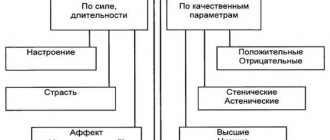One of the components of human character is will , which is present to one degree or another in every person.
Will is considered to be a character trait with the help of which a person is able to overcome life’s difficulties, make decisions and implement them, and lead a correct and proper lifestyle.
This character trait does not belong to the category of innate , each person independently educates and develops willpower, therefore, it does not manifest itself in people to the same extent. For example, one individual may have a stronger and stronger-willed character than another.
What is self-education? Find out about this from our article.
Characteristics of basic concepts
This area of character includes several concepts.
This is an act of will, effort and activity aimed at achieving a specific goal.
All these concepts have one thing in common, the need to make efforts to overcome life's obstacles and achieve the desired result .
However, these concepts are different, therefore, it makes sense to consider each of them separately.
Act
This is a complex and multi-stage process , which includes several actions, such as the desire or intention to achieve a particular effect, motivation that encourages a person to take the necessary actions, awareness of the need to achieve the desired result, the choice of ways to realize one’s intention and control over the implementation of the actions necessary to achieve your goals.
Such an act is characterized by the following features :
- The need to make certain efforts to achieve a goal.
- Having a plan that includes various aspects and effective activities.
- Fulfilling the plan and the points included in it does not give a person any pleasure or pleasant emotions.
- Directing efforts not only to overcome obstacles and obstacles that arise on the way to the goal, but also to fight with oneself, for example, with one’s own laziness and reluctance to make efforts.
Actions
This concept describes a set of measures and efforts applied to obtain the desired effect.
Moreover, all of them are controlled by a person at a conscious level, that is, the individual clearly understands what exactly and at what time he needs to do in order to get the desired result .
Such activities can be performed by a person of his own free will, or on instructions from other people.
For example, the process of acquiring knowledge in an educational institution is often not a person’s own initiative, but a necessity that is pointed out to him by other people, in particular, parents.
The main feature of these measures is their awareness and purposefulness.
Although, almost any activity can be considered related to will , because there is always a moment of awareness in it, and it is always aimed at achieving certain consequences.
For example, a person experiences hunger, he realizes that in order to satisfy it he needs to make certain movements (for example, go to the grocery store, cook food).
An effort
Volitional effort is considered to be an effort aimed at achieving certain consequences.
It is not always possible for a person to achieve the result he needs right away ; in some cases, especially if we are talking about difficult to achieve goals, he has to overcome difficulties and obstacles that arise on the way to the desired effect.
And for this the individual makes certain efforts . Often, in order to make any effort, a person is forced to make not one, but several attempts; in this case, it is volitional efforts that help him stick to his plan.
What you need to know about will
Lack of will is the highest barrier that prevents a person from changing. The problem is that it needs to be used on a daily basis, not every now and then to create a good habit or break a bad one. All our serious goals and plans collapse precisely because of our inability to control our will.
The concept of delayed gratification is closely related to will. In simple terms, it is the ability to focus on a long-term goal so as not to notice instant gratification that can interfere with plans. A week of intense training at the gym won't matter if we have a wild weekend of eating nothing but pizza and drinking.
Will is a limited resource. If we try to change, for example, stop acting impulsively, then by the evening we may experience depression and frustration. This threatens to return to an old habit. However, two points should be taken into account. First: the will can be trained - and thus we will be able to exercise it much longer during the day. Second: willpower can be wasted if you do not do what you need.
Since will is a limited resource, you need to plan your day in such a way as not to waste it. For example, avoiding places that may trigger a bad habit.
A high level of willpower almost always means high self-esteem (after all, we have something to be proud of), the ability to resist temptations in the form of alcohol, cigarettes and overeating, and improved mental and physical health.
Depleted willpower makes a person impulsive. This means that if you feel that your will is at zero, you need to do everything possible to remove temptations out of sight.
If you are convinced of the exceptional importance of developing the will, let's see exactly how this can be done. Remember that you have a long journey ahead, perhaps life-long.
1
Develop moral qualities
Researcher Kurt Gray, a doctorate in psychology at Harvard, explains this effect as a self-fulfilling prophecy: “People around them consider highly moral people to be more strong-willed and disciplined, able to endure discomfort without losing their heads.”
The researcher is confident that Gandhi or Mother Teresa were most likely not born strong-willed people, but became such by trying to help others. He introduces the concept of “moral transformation” because he suggests that moral actions can transform people from being lazy and procrastinating to strong-willed.
2
Don't waste your will
If you try really hard, you can completely exhaust your will by noon, which will have a catastrophic effect on the rest of the day and those important decisions that you will never be able to make.
For example, you set a goal to change your character, as Franklin did: allocate one or two weeks to one quality. It's a long marathon, so there's a lot to plan for.
Make not very important decisions in advance, which usually “suck” your energy. Create a menu for the coming months and stick to it. Buy the same shirts, trousers and shoes so as not to waste mental resources constantly thinking about what to wear and wear. Here and now you need to make only those decisions that concern your character. Take care of the rest in advance.
The same tips apply to other areas of life: losing weight, getting rid of bad habits, achieving the Advanced level in learning English and much more. Make all the non-important decisions in advance and focus only on the most important ones. Don't waste your will.
3
Have a self-reflection session
For this you will need a diary. Write down all the actions that you perform unconsciously (they have become habitual), but which you want to get rid of. For example:
- While working, I am constantly distracted by news sites.
- While reading, I like to be distracted by my phone.
- During a conversation, I focus on what I want to say, and not on the words of the interlocutor.
If you make a list of at least ten points, this can already be called a good self-reflection session. Now choose your two most destructive habits.
Write down what sequential actions these unwanted habits consist of. Actions should also be understood as thoughts and emotions associated with them. For example, if you tend not to listen when you're talking to someone, notice what thoughts or beliefs pop into your head. Probably, they are the ones that prevent you from concentrating on productive dialogue. Examine the nature of these thoughts.
Think about how you can stop this behavior. Remember that you can be conscious in every action you take. It's about habit, the main thing is to recognize the sequence of steps.
Over the next month, take full control of these two habits.
4
Stop for three seconds
Our life is a kilometer-long chain of habits. Some of them help, others hinder.
Throughout the day, stop in the middle of any activity (unless you're driving, of course) and think about what stage of which habit you are currently in. If we are talking about consuming bad food, then even pleasant thoughts about Coca-Cola are already part of the habit. Think for three seconds: what will this thought lead to? Of course, to the hype: “without cola I will be an unhappy person, but with cola I will be the happiest person on the planet.” Then go and buy it. Remember further: after you drank this soda, how do you feel? And in half an hour? It can be revealed that in fact you were deceiving yourself, becoming a victim of advertising and habit.
Try to be aware of yourself for three seconds as often as possible throughout the day. Using this method, you can get rid of the irresistible desire to criticize, get angry and be offended. Once “three seconds” becomes a habit, you will no longer exhaust your willpower with this exercise (it will begin to be performed automatically) and you will be able to change, motivate yourself to work, or stop unwanted actions much faster and more effectively.
We wish you good luck!
Did you like the article? Join our communities on social networks or our Telegram channel and don’t miss the release of new useful materials: TelegramVKontakteFacebook
We also recommend reading:
- Storytelling
- Overcoming Negative Behavior
- Strategy for overcoming bad habits
- What is the implementation of intentions
- Formation of useful habits
- All about habits +Marathon!
- How to review your progress over the past six months
- Spheres of personality
- Volitional personality traits
- Mental processes: types and brief description
- Halperin's theory of mental action
Key words:1Psychoregulation, 4Psychoregulation
What is volitional effort?
This concept consists of fulfilling certain intentions aimed at overcoming obstacles and obstacles on the way to the desired effect . This is willpower, an ability that is formed in a person throughout his life.
This process is influenced by many factors, in particular, habits, social living conditions, perception of the surrounding world (positive or negative), the speed of mental reactions (the ability to quickly make decisions).
A person has intelligence, which means he understands that it is necessary to make efforts only when it is really necessary.
This understanding is considered a kind of protective mechanism that protects the individual from doing meaningless things that will lead nowhere.
This means that this aspect has 2 important features :
- The presence of a goal , that is, the need to act, arises only when a person really needs to achieve one or another result.
- Life problems . A person is capable of exerting volitional efforts not only of his own free will, but also in order to overcome the troubles that arise in life.
Is there a place for volitional efforts in the integral interaction of a person with a group:
Lesson-lecture on the topic “Will”
Topic 2.9. Will
Plan
- The concept of will and volitional actions
- Structure of volitional action
- Volitional personality traits
- The concept of will and volitional actions
External obstacles are objective obstacles beyond a person’s control, external interference, opposition from other people, natural obstacles. Internal obstacles depend on the person himself, such as reluctance to do what is needed, the presence of conflicting impulses, a person’s passivity, bad mood, habit of acting rashly, laziness, a sense of fear, a sense of false pride, etc.
A person’s will is expressed in how much he is able to overcome obstacles and difficulties on the way to a goal, how much he can manage his behavior, and subordinate his activities to certain tasks.
Will is a person’s mental activity that determines his purposeful actions and actions related to overcoming difficulties and obstacles.
In everyday life, we call volitional actions associated with overcoming difficulties encountered along the path of life.
In scientific psychology, this phenomenon is considered as more complex and ambiguous.
Volitional action
is carried out according to a person’s own decision; it is conscious and intentional.
A person makes this personal decision based on external or internal necessity. Every volitional act is preceded by a certain thought; the success of our behavior depends on a clear vision of the goal and on the degree of its desirability for us. We always deal with will when we set goals for ourselves and make efforts to achieve them, overcoming the problems and difficulties that we encounter along the way.
The main function of the will is
to regulate actions and behavior, guide the needs, desires, and motives of a person.
Therefore, volitional regulation is closely related to the motivation of human behavior and actions. Voluntary behavior carried out for a strong, stable motive does not require volitional regulation.
If the motive is not very strong, then overcoming obstacles and difficulties in achieving the goal requires the so-called volitional effort
- a special state of neuropsychic tension that mobilizes a person’s physical, intellectual and moral strength.
Volitional effort is carried out through an additionally created incentive to action or activity.
However, will manifests itself not only in the ability to achieve a goal, but also in the ability to abstain from something.
“Great will,” wrote A.S. Makarenko, “is not only the ability to desire and achieve something, but also the ability to force yourself to give up something when necessary.”
So, will is the conscious regulation of human behavior and activity, which manifests itself in relation to oneself and is aimed at achieving goals and overcoming difficulties.
- Structure of volitional action
Volitional action has the following structure.
1.
Goal setting, i.e.
expected and intended result of an action. A person sets goals in order to satisfy his needs. It is important to realize the accessibility of the goal. Setting goals that a given person is unable to achieve creates a habit of not finishing what he has started. However, easily accessible goals do not develop willpower, do not develop the ability to deal with difficulties and overcome obstacles. Action goals should be accessible to a person, but require great effort to achieve them.
To correctly assess a volitional action, it is necessary to know the motives (impulses) that determined the setting of this goal and prompted the person to act. Every human action is performed for something (goal) and for some reason (motive). The activity may be the same, and the results may be the same, but the motives may be different.
When setting a goal, a person weighs many motives that may or may not correspond to the goal.
There is a so-called “struggle” of motives
.
This can be a struggle of motives of the same level
(you equally want to go to the cinema and theater in the evening, you equally want to become a driver and installer after graduating from school) and
a struggle of motives of different levels
(to go to the cinema or sit down to do your homework). In the second case, you need to realize the level of motives and give preference to a motive of a higher level.
The struggle of motives in volitional action is often a struggle between a sense of duty and impulses that contradict duty. Will manifests itself in the ability to force oneself to do what a sense of duty dictates, suppressing impulses that are contrary to duty. When it comes to whether to do what you need or what you want, you should give preference to the “should” motive.
If the motive and goal coincide, then a negligible effort of will is required. In order to go swimming in hot weather or start reading a long-wanted book, no serious effort of will is required. Defining a goal ends with making a decision - to act one way and not another, and the action is implemented.
2.
The next stage of volitional action is
mental planning - how and by what means to achieve the goal
.
There may also be serious struggles and conflicts of motives in the choice of means.
In order for a student to pass the exam well, you can either learn everything well, or prepare a cheat sheet, or hope to copy from a fellow student. When choosing means, one inevitably has to take into account the norms of behavior in force in society. It is unacceptable to proceed from the principle “the end justifies the means”, i.e. To achieve the goal, all means are good.
3.
The last step in volitional action is
execution, the commission of an action.
At this stage, a person faces not only internal difficulties, as in the case of a conflict of motives, but also various external difficulties that prevent the achievement of the goal. It is at this stage that the strength or weakness of a person’s will is revealed. Good plans are worthless if they are not implemented.
Execution can take two forms: the form of external action (external volitional act) and the form of abstaining from external action (internal volitional act)
.
When, for example, a student refrains from giving a hint (and he really wants to give a hint to a friend), from the desire to rudely answer an elder, the volitional action is expressed in the suppression of the action.
If a person deviates from the accepted goal, then he shows a lack of will. Of course, in cases where circumstances change, some new conditions arise and the implementation of a previously made decision becomes irrational, a conscious refusal of the decision made is necessary. A strong-willed person must be able, when necessary, to abandon the intended action and make a new decision, otherwise it will no longer be a manifestation of will, but senseless stubbornness.
The result of volitional action is the achievement of a goal. The volitional action ends with its assessment:
a person evaluates the methods he has chosen to achieve a goal, the efforts expended, and draws appropriate conclusions for the future.
- Volitional personality traits
Analysis of a person’s volitional behavior allows us to identify a number of volitional qualities, each of which characterizes individual volitional manifestations. Strong-willed qualities include dedication, independence, determination, perseverance, endurance, courage, courage, and discipline.
Determination
- this is a person’s subordination of his behavior to a sustainable life goal, the readiness and determination to devote all his strength and abilities to achieve it, its systematic, steady implementation. From this long-term goal, private goals emerge as necessary steps on the way to achieving the main goal; everything superfluous and unnecessary is discarded.
Independence
- subordination of behavior to one’s own views and beliefs.
An independent person does not give in to attempts to persuade him to take actions that are not consistent with his beliefs. However, this does not mean that he rejects every other person's opinion. An independent person is always ready to consider other people's advice and instructions, evaluate them and, if they are reasonable, accept them. In those cases when every other person's opinion is rejected simply because it is alien, when there is unfounded opposition to everything that comes from other people, a negative quality of will is revealed - negativism
. A negativist does not have independent will. Trying at all costs to act contrary to other people's advice, rejecting all kinds of
including reasonable, outside instructions, he often acts even contrary to his own views and beliefs.
The opposite of negativism, but also a negative quality of will - suggestibility
. A suggestible person easily succumbs to the influence of others, he does not know how to think critically about other people’s advice and resist them if necessary, and accepts any other people’s advice, even obviously untenable ones. Both suggestibility and negativism are expressions of weakness of will, since in both cases a person cannot subordinate his actions to the arguments of reason, in both cases he acts, blindly accepting or just as blindly rejecting other people's influences.
Determination
is the ability to make informed and sustainable decisions in a timely manner and proceed to their implementation without unnecessary delays. Determination is especially evident in difficult situations, where there is a choice of one option out of several, and where action is associated with some risk.
Indecisive people either quickly and hastily make a decision without having time to think about it, or they are late to make a decision in a timely manner.
A consequence of the validity of decisions is their stability. An indecisive person is not sure of the correctness of his decision. He constantly revises, postpones, cancels the decision he has made. A necessary sign of determination is an energetic move to implement the decision. An indecisive person, even having made a decision, cannot bring himself to begin implementing it, sometimes clinging to every opportunity to postpone his actions, convincing himself that the implementation of the decision can be delayed.
Decisiveness, finally, presupposes the ability to quickly delay or even stop implementing a decision if new circumstances require it.
Perseverance
- this is the ability to follow through on decisions made, to achieve a set goal, overcoming all sorts of obstacles and difficulties on the way to it. In the event of failures, a persistent person does not lose heart, but, on the contrary, becomes imbued with an even firmer determination to achieve what is planned and looks for new ways and means for this. Persistence is especially evident in difficult, boring, hard work.
One should distinguish from perseverance a negative quality of will - stubbornness
. If a persistent person strives for a goal whose positive nature is clear, then a stubborn person pursues unreasonable goals. A stubborn person often realizes that he is wrong, understands that his actions are inappropriate, but continues to defend an erroneous point of view, guided by the desire to do his own thing at all costs, to insist on his own. Stubbornness only covers up weakness of will, since a stubborn person is not able to overcome himself, is not able to refuse actions, the error of which he himself often understands.
Excerpt
(self-control) is the ability to constantly control one's behavior. This quality presupposes the ability to refrain from actions that are perceived as unnecessary or harmful in given conditions, and to maintain composure even in difficult and difficult circumstances. A self-possessed person is hardy and patient. In case of need, he is capable of steadfastly enduring hardships that cause him inconvenience, enduring pain, delaying, when necessary, the satisfaction of his needs (hunger, thirst, need for rest, etc.).
The opposite negative quality is impulsiveness
(from the Latin word <impulsus> - push, urge) - the tendency to act on the first impulse, hastily, without thinking about one’s actions.
Courage and courage
- this is a person’s readiness to achieve a goal, despite the danger to life or personal well-being, overcoming adversity, suffering, and deprivation. What these two qualities have in common is readiness to perform dangerous actions.
The opposite negative quality is cowardice.
Fear for oneself, for one’s life, guides the actions of a cowardly person, who as a result can easily betray his duty.
Discipline
is the conscious subordination of one’s behavior to social rules. Conscious discipline is manifested in the fact that a person, without coercion, recognizes the obligation to fulfill certain obligations and rules.
53
Types of volitional actions
Activities that require willpower can be simple or complex .
A simple case includes only 2 components. This is setting a goal and achieving it .
Such activities are aimed at obtaining the basic needs that a person needs every day (for example, satisfying hunger or thirst, observing hygiene rules, purchasing certain goods and other issues that an individual encounters in everyday life).
Complex cases are more diverse and involve several factors.
This is, first of all, setting a goal, realizing it, selecting the most appropriate opportunities and methods for achieving it, developing motivation that encourages a person to make efforts, the struggle of various motives and setting priorities (for example, if a person has several complex needs, the simultaneous satisfaction of which is impossible, he needs to choose the most important, priority motivation leading to achieving a result), making a decision and performing certain activities until the desired consequences occur.
In addition, such measures can be independent, that is, when a person himself wants to take them, or forced.
In this case, the motivating motive for performing this or that activity is difficult life situations, obstacles that prevent the individual from enjoying his life.
For example, if a person finds himself in a difficult financial situation, sooner or later he realizes that he needs to get a better-paying job. This is his goal.
A person also has motivation ; a new job will allow him to improve his financial situation and achieve a higher standard of living. He begins to draw up a plan to achieve the desired result.
After this, the individual puts his plan into practice , that is, he begins to take specific measures (look for vacancies, go to interviews, engage in self-development) until he fulfills his plans.
Functions of the will
The will has two functions: incentive and inhibitory.
A driving will is an action or set of actions that you need to take (instilling a good habit). Inhibitory - an action that does not need to be performed (eradicating a bad habit).
Will is manifested to one degree or another in all people. However, many, despite the fact that they rationally understand that bad behavior or habit destroys life and can be very expensive (sedentary lifestyle, alcohol consumption, smoking), change their lifestyle and behavior only for a short period of time. After a few days, weeks or months, habit takes over and the will becomes overwhelmed. Until the hour when sufficiently strong fear or self-loathing arises again.
There is a certain threshold of desire that separates motivation and will: when the desire lies below this threshold, it is motivation, and when it crosses it, the action becomes volitional.
Psychological structure
Any act of will has a certain structure, which depends on its complexity .
Thus, simple actions are a process in which a person makes a decision and then takes certain actions to implement it.
Complex actions are more diverse. There are also 2 stages here: preparatory and implementation .
The preparatory stage includes setting a goal, identifying motives (and their struggle, when a person is wondering whether he really needs this goal) and opportunities to achieve results.
The implementation stage involves the presence of special activities, for example, the development of an action plan and their implementation.
Characteristics of levels of regulation of human behavior
The sensory-perceptual level is characterized by a situation in which images that regulate movements and actions control a person’s behavior regardless of his desires and are involuntary.
Are you an expert in this subject area? We invite you to become the author of the Directory Working Conditions
The voluntary level is characterized by the implementation of actions that are consciously regulated, implying a conscious intention, systematic implementation and control over the results of the action. At this level, actions are carried out by the object itself according to a motive determined by it, and do not require volitional regulation due to the fact that the components of the personality remain not included in the process of carrying out the action.
The process of volitional regulation begins at the moment when a person encounters obstacles on the way to carrying out his activities, external difficulties (time, space, physical properties of things) or internal difficulties (negative attitude, fatigue, stress)
Thus, we can conclude that volitional regulation is a connection to existing immediate motives that are personally significant for the individual. Most often these are moral motives. The more moral motives predominate in a person, the easier it is for him to carry out certain volitional actions.
Simple and complex actions: differences
How does a simple volitional action differ from a complex one?
An act of will consists of certain elements , such as goal setting, motivation to act (motivation), assessment of available opportunities to achieve it, development of a specific plan of action and their subsequent implementation.
This is an example of a complex act of will aimed at obtaining a more difficult result.
Simple goals do not require such a large number of psychological and physical actions, therefore, the structure of the volitional act aimed at achieving them is less multi-stage.
Thus, a person conceives a simple desire and begins to realize it . This is the difference between complex and simple volitional actions.
Properties and patterns of volitional processes
Will, as a mental process, has certain qualities:
- by force;
- sustainability;
- latitude.
Let's look at them in more detail:
Willpower is the degree of arousal of volitional effort.
Stability of will is the stability and constancy of manifestation in certain repeating situations.
Latitude of will is a certain number of activities available to a person, the implementation of which requires the manifestation of volitional efforts.
The process of implementing volitional efforts is inextricably linked with the process of personality development and finds its manifestation in its qualities and properties. There are three blocks of volitional personality traits:
- moral and volitional qualities, which include such qualities as responsibility, commitment, initiative, discipline;
- emotional-volitional qualities, including determination, endurance, patience, calmness;
- actually strong-willed qualities, among which it is necessary to note courage, courage, determination and perseverance.










